3 nov 2016
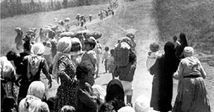
By Ramzy Baroud
Last July, the Palestinian Authority took the unexpected, although belated step of seeking Arab backing in suing Britain over the Balfour Declaration. That “declaration” was the first ever explicit commitment made by Britain, and the West in general, to establish a Jewish homeland atop an existing Palestinian homeland.
It is too early to tell whether the Arab League will heed the Palestinian call, or if the PA will even follow through, especially considering the latter has the habit of making too many proclamations backed by little or no action.
However, it seems that the next year will witness a significant tug of war regarding the Balfour Declaration, the 100th anniversary of which will be commemorated on 2 November 2017.
But who is Balfour, what is the Balfour Declaration and why does all of this matter today?
Britain’s Foreign Secretary from late 1916, Arthur James Balfour, pledged Palestine to another people. That promise was made on 2 November 1917 on behalf of the British government in the form of a letter sent to the leader of the Jewish community in Britain, Walter Rothschild.
At the time, Britain was not even in control of Palestine, which was still part of the Ottoman Empire. Either way, Palestine was never Balfour’s to so casually transfer to anyone else. His letter read:
“His Majesty’s government view with favour the establishment in Palestine of a national home for the Jewish people, and will use their best endeavours to facilitate the achievement of this object, it being clearly understood that nothing shall be done which may prejudice the civil and religious rights of existing non-Jewish communities in Palestine, or the rights and political status enjoyed by Jews in any other country.”
He concluded: “I should be grateful if you would bring this declaration to the knowledge of the Zionist Federation.”
Balfour was hardly acting on his own. True, the declaration bears his name, yet, in reality, he was a loyal agent of an Empire with massive geopolitical designs, not only concerning Palestine alone, but with Palestine as part of a larger Arab landscape.
Only a year earlier, another sinister document was introduced, albeit secretly. It was endorsed by another top British diplomat, Mark Sykes and, on behalf of France, by François Georges-Picot. The Russians were informed of the agreement, as they too had received a piece of the Ottoman cake.
The document indicated that, once the Ottomans were soundly defeated, their territories, including Palestine, would be split among the prospective victorious parties.
The Sykes-Picot Agreement, also known as the “Asia Minor Agreement”, was signed in secret 100 years ago, two years into World War I. It signified the brutal nature of colonial powers that rarely associated land and resources with people who lived upon or owned them.
The centerpiece of the agreement was a map that was marked with straight lines by a China graph pencil. The map largely determined the fate of the Arabs, dividing them in accordance with various haphazard assumptions of tribal and sectarian lines.
The improvised map consisted not only of lines but also colours, along with language that attested to the fact that the two countries viewed the Arab region purely on materialistic terms, without paying the slightest attention to the possible repercussions of slicing up entire civilizations with a multifarious history of co-operation and conflict.
The Sykes-Picot negotiations were completed in March 1916 and, although official, were secretly signed on 19 May 1916.
WWI concluded on 11 November 1918, after which the division of the Ottoman Empire began in earnest.
British and French mandates were extended over divided Arab entities, while Palestine was granted to the Zionist movement a year later, when Balfour conveyed the British government’s promise, sealing the fate of Palestinians to a life of perpetual war and turmoil.
Rarely was British-Western hypocrisy and complete disregard for the national aspiration of any other nation on full display as in the case of Palestine. Beginning with the first wave of Zionist Jewish migration to Palestine in 1882, European countries helped facilitate the movement of illegal settlers and resources, where the establishment of many colonies, large and small, was afoot.
So when Balfour sent his letter to Rothschild, the idea of a Jewish homeland in Palestine was very much plausible.
Still, many supercilious promises were being made to the Arabs during the Great War years, as the Arab leadership sided with the British in their war against the Ottoman Empire. Arabs were promised instant independence, including that of the Palestinians.
When the intentions of the British and their rapport with the Zionists became too apparent, Palestinians rebelled, marking a rebellion that has never ceased 99 years later, and highlighting the horrific consequences of British colonialism and the eventual complete Zionist takeover of Palestine which is still felt after all of these years.
Paltry attempts to pacify Palestinian anger were to no avail, especially after the League of Nations Council in July 1922 approved the terms of the British Mandate over Palestine – which was originally granted to Britain in April 1920 – without consulting the Palestinians at all. In fact, Palestinians would disappear from the British and international radar, only to reappear as negligible rioters, troublemakers and obstacles to the joint British-Zionist colonial concoctions.
Despite occasional assurances to the contrary, the British intention of ensuring the establishment of an exclusively Jewish state in Palestine was becoming clearer with time. The Balfour Declaration was not merely an aberration, but had, indeed, set the stage for the full-scale ethnic cleansing that followed, three decades later.
In fact, that history remains in constant replay: the Zionists claimed Palestine and renamed it “Israel”; the British continue to support them, although never ceasing to pay lip-service to the Arabs; and the Palestinian people remain a nation that is geographically fragmented between refugee camps, the diaspora, militarily occupied, or treated as second class citizens in a country upon which their ancestors dwelt since time immemorial.
While Balfour cannot be blamed for all the misfortunes that have befallen Palestinians since he communicated his brief, but infamous letter, the notion that his “promise” embodied – that of complete disregard of the aspirations and rights of the Palestinian Arab people – that very letter is handed from one generation of British diplomats to the next, in the same way that Palestinian resistance to colonialism has and continues to spread across generations.
That injustice continues, thus the perpetuation of the conflict. What the British, the early Zionists, the Americans and subsequent Israeli governments failed to understand, and continue to ignore at their own peril, is that there can be no peace without justice and equality in Palestine; and that Palestinians will continue to resist, as long as the reasons that inspired their rebellion nearly a century ago, remain in place.
– Dr. Ramzy Baroud has been writing about the Middle East for over 20 years. He is an internationally-syndicated columnist, a media consultant, an author of several books and the founder of PalestineChronicle.com.
Last July, the Palestinian Authority took the unexpected, although belated step of seeking Arab backing in suing Britain over the Balfour Declaration. That “declaration” was the first ever explicit commitment made by Britain, and the West in general, to establish a Jewish homeland atop an existing Palestinian homeland.
It is too early to tell whether the Arab League will heed the Palestinian call, or if the PA will even follow through, especially considering the latter has the habit of making too many proclamations backed by little or no action.
However, it seems that the next year will witness a significant tug of war regarding the Balfour Declaration, the 100th anniversary of which will be commemorated on 2 November 2017.
But who is Balfour, what is the Balfour Declaration and why does all of this matter today?
Britain’s Foreign Secretary from late 1916, Arthur James Balfour, pledged Palestine to another people. That promise was made on 2 November 1917 on behalf of the British government in the form of a letter sent to the leader of the Jewish community in Britain, Walter Rothschild.
At the time, Britain was not even in control of Palestine, which was still part of the Ottoman Empire. Either way, Palestine was never Balfour’s to so casually transfer to anyone else. His letter read:
“His Majesty’s government view with favour the establishment in Palestine of a national home for the Jewish people, and will use their best endeavours to facilitate the achievement of this object, it being clearly understood that nothing shall be done which may prejudice the civil and religious rights of existing non-Jewish communities in Palestine, or the rights and political status enjoyed by Jews in any other country.”
He concluded: “I should be grateful if you would bring this declaration to the knowledge of the Zionist Federation.”
Balfour was hardly acting on his own. True, the declaration bears his name, yet, in reality, he was a loyal agent of an Empire with massive geopolitical designs, not only concerning Palestine alone, but with Palestine as part of a larger Arab landscape.
Only a year earlier, another sinister document was introduced, albeit secretly. It was endorsed by another top British diplomat, Mark Sykes and, on behalf of France, by François Georges-Picot. The Russians were informed of the agreement, as they too had received a piece of the Ottoman cake.
The document indicated that, once the Ottomans were soundly defeated, their territories, including Palestine, would be split among the prospective victorious parties.
The Sykes-Picot Agreement, also known as the “Asia Minor Agreement”, was signed in secret 100 years ago, two years into World War I. It signified the brutal nature of colonial powers that rarely associated land and resources with people who lived upon or owned them.
The centerpiece of the agreement was a map that was marked with straight lines by a China graph pencil. The map largely determined the fate of the Arabs, dividing them in accordance with various haphazard assumptions of tribal and sectarian lines.
The improvised map consisted not only of lines but also colours, along with language that attested to the fact that the two countries viewed the Arab region purely on materialistic terms, without paying the slightest attention to the possible repercussions of slicing up entire civilizations with a multifarious history of co-operation and conflict.
The Sykes-Picot negotiations were completed in March 1916 and, although official, were secretly signed on 19 May 1916.
WWI concluded on 11 November 1918, after which the division of the Ottoman Empire began in earnest.
British and French mandates were extended over divided Arab entities, while Palestine was granted to the Zionist movement a year later, when Balfour conveyed the British government’s promise, sealing the fate of Palestinians to a life of perpetual war and turmoil.
Rarely was British-Western hypocrisy and complete disregard for the national aspiration of any other nation on full display as in the case of Palestine. Beginning with the first wave of Zionist Jewish migration to Palestine in 1882, European countries helped facilitate the movement of illegal settlers and resources, where the establishment of many colonies, large and small, was afoot.
So when Balfour sent his letter to Rothschild, the idea of a Jewish homeland in Palestine was very much plausible.
Still, many supercilious promises were being made to the Arabs during the Great War years, as the Arab leadership sided with the British in their war against the Ottoman Empire. Arabs were promised instant independence, including that of the Palestinians.
When the intentions of the British and their rapport with the Zionists became too apparent, Palestinians rebelled, marking a rebellion that has never ceased 99 years later, and highlighting the horrific consequences of British colonialism and the eventual complete Zionist takeover of Palestine which is still felt after all of these years.
Paltry attempts to pacify Palestinian anger were to no avail, especially after the League of Nations Council in July 1922 approved the terms of the British Mandate over Palestine – which was originally granted to Britain in April 1920 – without consulting the Palestinians at all. In fact, Palestinians would disappear from the British and international radar, only to reappear as negligible rioters, troublemakers and obstacles to the joint British-Zionist colonial concoctions.
Despite occasional assurances to the contrary, the British intention of ensuring the establishment of an exclusively Jewish state in Palestine was becoming clearer with time. The Balfour Declaration was not merely an aberration, but had, indeed, set the stage for the full-scale ethnic cleansing that followed, three decades later.
In fact, that history remains in constant replay: the Zionists claimed Palestine and renamed it “Israel”; the British continue to support them, although never ceasing to pay lip-service to the Arabs; and the Palestinian people remain a nation that is geographically fragmented between refugee camps, the diaspora, militarily occupied, or treated as second class citizens in a country upon which their ancestors dwelt since time immemorial.
While Balfour cannot be blamed for all the misfortunes that have befallen Palestinians since he communicated his brief, but infamous letter, the notion that his “promise” embodied – that of complete disregard of the aspirations and rights of the Palestinian Arab people – that very letter is handed from one generation of British diplomats to the next, in the same way that Palestinian resistance to colonialism has and continues to spread across generations.
That injustice continues, thus the perpetuation of the conflict. What the British, the early Zionists, the Americans and subsequent Israeli governments failed to understand, and continue to ignore at their own peril, is that there can be no peace without justice and equality in Palestine; and that Palestinians will continue to resist, as long as the reasons that inspired their rebellion nearly a century ago, remain in place.
– Dr. Ramzy Baroud has been writing about the Middle East for over 20 years. He is an internationally-syndicated columnist, a media consultant, an author of several books and the founder of PalestineChronicle.com.
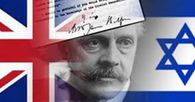
The Hamas Movement has renewed its vow to remain adherent to the right of return, to continue resisting the occupation and not to cede an iota of the Palestinian soil.
“Our right to the entire Palestinian soil is sacred, and cannot be abolished by a criminal’s promise to another criminal or by any power regardless of its superiority,” Hamas stated in a press release on the 99th anniversary of the Balfour declaration.
“The Balfour declaration was the gateway to injustice, criminality and abuse against the Palestinian people, their holy sites and rights,” it added.
It emphasized that it would never recognize the existence of Israel on the Palestinian land or any peace agreement with it, and would not allow anyone to relinquish the Palestinian people’s right to return to their homes.
“Our right to the entire Palestinian soil is sacred, and cannot be abolished by a criminal’s promise to another criminal or by any power regardless of its superiority,” Hamas stated in a press release on the 99th anniversary of the Balfour declaration.
“The Balfour declaration was the gateway to injustice, criminality and abuse against the Palestinian people, their holy sites and rights,” it added.
It emphasized that it would never recognize the existence of Israel on the Palestinian land or any peace agreement with it, and would not allow anyone to relinquish the Palestinian people’s right to return to their homes.
2 nov 2016
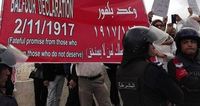
The Jordanian security forces suppressed Wednesday afternoon a sit-in organized outside the British Embassy in Jordanian capital Amman in protest against Balfour Declaration.
The protesters held banners reading: “The Balfour Declaration 1917 is an ill-famed promise from those who do not own to those who do not deserve”.
A movement called the Balfour Declaration Centenary Campaign had earlier urged for action outside the British Embassy in Amman marking the 99th anniversary of the declaration.
The 2nd of November marks the centenary of the Balfour Declaration of 1917, which began the still-ongoing occupation of Palestine and sowed the seeds of an endless nightmare for the Palestinian people, both those who were forced to flee at gunpoint and those who have managed to remain in the shredded remains of their homeland under Israel’s brutal military occupation.
The protesters held banners reading: “The Balfour Declaration 1917 is an ill-famed promise from those who do not own to those who do not deserve”.
A movement called the Balfour Declaration Centenary Campaign had earlier urged for action outside the British Embassy in Amman marking the 99th anniversary of the declaration.
The 2nd of November marks the centenary of the Balfour Declaration of 1917, which began the still-ongoing occupation of Palestine and sowed the seeds of an endless nightmare for the Palestinian people, both those who were forced to flee at gunpoint and those who have managed to remain in the shredded remains of their homeland under Israel’s brutal military occupation.
14 oct 2016
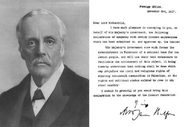
Hardline Jewish Israeli extremists marched on Monday, through annexed East Jerusalem’s Old City area, provoking the city’s Palestinian residents and, in some instances, holding religious rituals at the gates of al-Aqsa Mosque, residents said.
The extremists, who held their activities under heavy police protection, were marking the last day of the Jewish “Sukkot” holiday, according to WAFA.
The site is revered by Muslims as their 3rd holiest site, while Jews claim that the mosque is placed at the site of two Jewish temples which were destroyed in ancient times.
Meanwhile on Monday, Palestinian officials and activists decided to hold year-long activities, in Palestine and around the world, to mark 100 years since the Balfour Declaration.
November 2, 1917, is the date marking 100 years since then British foreign secretary, Arthur Balfour, had promised, in a letter to Zionist leaders, a homeland for the Jews in Palestine. The letter triggered the century-long Palestinian-Israeli conflict, and many other wars in the Middle East.
“The Balfour Declaration is in its essence a colonialist project,” Taysir Khalid, member of the executive committee of the Palestine Liberation Organization (PLO), told the meeting held at the PLO’s Ramallah headquarters.
He said that the activities will continue until November 2, 2017, with a goal “to remind the world, and particularly Britain, that they should face their historic responsibility and to atone for the crime the British government had committed against the Palestinian people.
The extremists, who held their activities under heavy police protection, were marking the last day of the Jewish “Sukkot” holiday, according to WAFA.
The site is revered by Muslims as their 3rd holiest site, while Jews claim that the mosque is placed at the site of two Jewish temples which were destroyed in ancient times.
Meanwhile on Monday, Palestinian officials and activists decided to hold year-long activities, in Palestine and around the world, to mark 100 years since the Balfour Declaration.
November 2, 1917, is the date marking 100 years since then British foreign secretary, Arthur Balfour, had promised, in a letter to Zionist leaders, a homeland for the Jews in Palestine. The letter triggered the century-long Palestinian-Israeli conflict, and many other wars in the Middle East.
“The Balfour Declaration is in its essence a colonialist project,” Taysir Khalid, member of the executive committee of the Palestine Liberation Organization (PLO), told the meeting held at the PLO’s Ramallah headquarters.
He said that the activities will continue until November 2, 2017, with a goal “to remind the world, and particularly Britain, that they should face their historic responsibility and to atone for the crime the British government had committed against the Palestinian people.
30 nov 2015
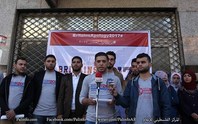
A campaign was launched on Sunday in Gaza to push for an apology from the British government for the Balfour Declaration.
“Britain Apologizes by 2017” is an international popular campaign that was first launched by the U.K-based Palestinian Return Center (PRC) by the American Society of Friends- Quakers. It aims at seeking an apology from British authorities for the Balfour Declaration.
The campaign, which was announced in a press conference in Gaza, aims at holding Britain responsible for the displacement of the Palestinian people. The campaign also aims to put pressure on the British government in order to officially and legally apologize to the Palestinian people within two years.
The Balfour Declaration, dated November 02, 1917, was a letter from the United Kingdom's Foreign Secretary Arthur James Balfour to Walter Rothschild, 2nd Baron Rothschild, an extremist leader of the British Jewish community, licensing the establishment in Palestine of a self-proclaimed Jewish state.
“Britain Apologizes by 2017” is an international popular campaign that was first launched by the U.K-based Palestinian Return Center (PRC) by the American Society of Friends- Quakers. It aims at seeking an apology from British authorities for the Balfour Declaration.
The campaign, which was announced in a press conference in Gaza, aims at holding Britain responsible for the displacement of the Palestinian people. The campaign also aims to put pressure on the British government in order to officially and legally apologize to the Palestinian people within two years.
The Balfour Declaration, dated November 02, 1917, was a letter from the United Kingdom's Foreign Secretary Arthur James Balfour to Walter Rothschild, 2nd Baron Rothschild, an extremist leader of the British Jewish community, licensing the establishment in Palestine of a self-proclaimed Jewish state.
3 nov 2015
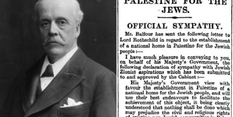
On the second of November, Ninety-eight years ago, the destiny of our nation changed due to the action of a foreign colonial power.
The Balfour Declaration should serve as a reminder that what is happening in Palestine is a result of a colonial decisions made in faraway capitals.Mr. Balfour, on behalf of Great Britain, promised Palestine, a country over which Britain had no legal right, to another people.
From 85,000 Jews in Palestine (around 12 percent of Palestine’s population), few of them were Zionists, and the declaration was even rejected by the only Jewish member of the British Cabinet at that time, Lord Montagu.
In 1917 Palestinians rejected the Balfour Declaration, making clear that the problem was not with Jews living in Palestine, but with the transformation of an Arab country overwhelmingly Christian and Muslim, into an exclusively Jewish State.
The international community must assume its historic responsibility and take immediate steps to remediate the decades of occupation, colonialism and exile.
The United Kingdom in particular should close the darkness of its colonialist past in the region by taking concrete steps in order to protect and promote Palestinian rights, including the recognition of the State of Palestine on the 1967 border with East Jerusalem as its capital.
The Balfour Declaration should serve as a reminder that what is happening in Palestine is a result of a colonial decisions made in faraway capitals.Mr. Balfour, on behalf of Great Britain, promised Palestine, a country over which Britain had no legal right, to another people.
From 85,000 Jews in Palestine (around 12 percent of Palestine’s population), few of them were Zionists, and the declaration was even rejected by the only Jewish member of the British Cabinet at that time, Lord Montagu.
In 1917 Palestinians rejected the Balfour Declaration, making clear that the problem was not with Jews living in Palestine, but with the transformation of an Arab country overwhelmingly Christian and Muslim, into an exclusively Jewish State.
The international community must assume its historic responsibility and take immediate steps to remediate the decades of occupation, colonialism and exile.
The United Kingdom in particular should close the darkness of its colonialist past in the region by taking concrete steps in order to protect and promote Palestinian rights, including the recognition of the State of Palestine on the 1967 border with East Jerusalem as its capital.

The U.K-based Palestinian Return Centre (PRC) has launched an international campaign to mark the centenary of the notorious Balfour Declaration and push for an apology from the British government for the Declaration.
PRC’s director Majed al-Zeir said in press statements a set of activities are to be staged both nationwide and overseas to mobilize mass condemnation of the ill-famed Balfour Declaration and galvanize international support in seeking an apology from British authorities for the many human rights violations in Palestine during British Mandate.
The Israeli occupation authorities and government are, meanwhile, expected to mark the same notorious occasion as a victory for the world’s anti-Palestine and pro-colonization powers.
The London-based PRC has collected thousands of signatures for the campaign titled “Britain, It's Time to Apologize, International Balfour Campaign” initiated sometime earlier.
The Balfour Declaration (dated 2 November 1917) was a letter from the United Kingdom's Foreign Secretary Arthur James Balfour to Walter Rothschild, 2nd Baron Rothschild, an extremist leader of the British Jewish community, licensing the establishment in Palestine of a self-proclaimed Jewish state.
PRC’s director Majed al-Zeir said in press statements a set of activities are to be staged both nationwide and overseas to mobilize mass condemnation of the ill-famed Balfour Declaration and galvanize international support in seeking an apology from British authorities for the many human rights violations in Palestine during British Mandate.
The Israeli occupation authorities and government are, meanwhile, expected to mark the same notorious occasion as a victory for the world’s anti-Palestine and pro-colonization powers.
The London-based PRC has collected thousands of signatures for the campaign titled “Britain, It's Time to Apologize, International Balfour Campaign” initiated sometime earlier.
The Balfour Declaration (dated 2 November 1917) was a letter from the United Kingdom's Foreign Secretary Arthur James Balfour to Walter Rothschild, 2nd Baron Rothschild, an extremist leader of the British Jewish community, licensing the establishment in Palestine of a self-proclaimed Jewish state.

Islamic Resistance Movement, Hamas, said Balfour Declaration is unjust, null and void, and charged Britain of responsibility for its consequences and ongoing sufferings until the moment.
In a statement on the 98th anniversary of Balfour Declaration, Hamas on Monday said the Palestinian people adheres to its constant rights and refuses bargaining in this regard.
Hamas confirmed its commitment to resistance by all means including armed resistance as a strategic option in order to get rid of the Israeli occupation and to achieve the liberation of Palestine and its holy places.
The resistance movement also urged Palestinians to escalate Jerusalem Intifada and called for national unity in order to be able to confront Israeli aggressive practices against the Aqsa Mosque.
Hamas called on the international community to intervene to protect the Palestinian refugees wherever they are and to offer them a secure and honorable life in Syria, Lebanon, and Iraq and spare them consequences of civil wars.
In a statement on the 98th anniversary of Balfour Declaration, Hamas on Monday said the Palestinian people adheres to its constant rights and refuses bargaining in this regard.
Hamas confirmed its commitment to resistance by all means including armed resistance as a strategic option in order to get rid of the Israeli occupation and to achieve the liberation of Palestine and its holy places.
The resistance movement also urged Palestinians to escalate Jerusalem Intifada and called for national unity in order to be able to confront Israeli aggressive practices against the Aqsa Mosque.
Hamas called on the international community to intervene to protect the Palestinian refugees wherever they are and to offer them a secure and honorable life in Syria, Lebanon, and Iraq and spare them consequences of civil wars.
